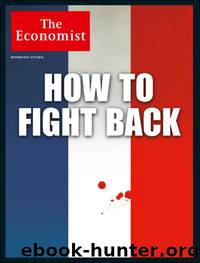TE20151121 by MrDi

Author:MrDi
Language: eng
Format: mobi
Tags: News, The Economist
Publisher: The Economist
Published: 2015-11-19T22:00:00+00:00
* * *
This article was downloaded by calibre from http://www.economist.com/news/europe/21678831-year-after-colossal-bank-fraud-country-imploding-small-enough-fail/print
Previous Articles Sections Next
Previous Articles Sections Next
Politics and social networks
Extreme tweeting
Few of the social-media stars among Europe’s politicians are centrists
Nov 21st 2015 | From the print edition
MOST politicians these days know how to compose a tweet and post a Facebook update; some are competentselfie-takers. Yet Europe’s mainstream lawmakers are badly losing the battle for online attention to politicians from the populist right and the far left.
On average, a Facebook message from UKIP, a Eurosceptic British political party, received around 4,000 “likes” this year—double that of the ruling Conservatives. France’s right-wing National Front beat the Socialist party by five to one on the same measure. MEPs in Europe of Nations and Freedom, an anti-EU group, have many more Twitter followers than their politically centrist peers (see chart). Each of their tweets is shared an average of 28 times, compared with six for mainstream politicians. The far left is as competent as the right. The swift rise of Spain’s Podemos and Italy’s Five Star Movement owes much to smart social-media campaigns.
Why are strongly left- and right-wing parties so popular on social networks? One reason is that they are prolific. In October Marine Le Pen, the leader of the National Front, tweeted 626 times. Italy’s Northern League posted on social media once every six minutes this month, on average. Populists also interact with supporters better than mainstream parties do, says Jamie Bartlett of Demos, a think-tank in London. Until recently a 16-year-old girl ran the Twitter account of the English Defence League, a virulently anti-Islamist outfit. She worked long days posting messages and responding to fans.
Social media reward starkness, not subtlety. Ms Le Pen’s tweeting “Bye Bye Schengen” in September was shared 600 times. By contrast, a message from Donald Tusk, the president of the European Council, calling for more co-ordination between Europe’s home and foreign policies went largely unnoticed. Politicians on the fringes can react to news faster than their moderate counterparts, whose statements are carefully scrutinised before publication. Matteo Salvini of the Northern League is often quick to comment on Italy’s latest immigration problem. Populists are spurred on by a sense of victimhood and tend to get more “fired up” than the mainstream, explains Peter Neumann of the International Centre for the Study of Radicalisation at King’s College London.
Parties of left and right do not just make noise online, they also use social media to organise their supporters. One report from Demos shows that over a quarter of online supporters of far-right parties had taken part in a protest in the past six months. Social media are also handy for raising money. Last year Golden Dawn, a Greek neo-Nazi party, had a “Christmas fund-raising drive” on Facebook.
Research on whether tweets can change voters’ minds is inconclusive, but a large study of America’s congressional elections in 2012 showed that politically charged Facebook messages substantially increased voter turnout. And social networks’ role in spreading information is bound to grow. A third of Europeans use such platforms every day, up from a fifth in 2010.
Download
This site does not store any files on its server. We only index and link to content provided by other sites. Please contact the content providers to delete copyright contents if any and email us, we'll remove relevant links or contents immediately.
Unwinding Anxiety by Judson Brewer(72946)
The Art of Coaching by Elena Aguilar(53129)
The Fast Metabolism Diet Cookbook by Haylie Pomroy(21113)
Rewire Your Anxious Brain by Catherine M. Pittman(18617)
Healthy Aging For Dummies by Brent Agin & Sharon Perkins RN(17028)
Talking to Strangers by Malcolm Gladwell(13327)
The Art of Thinking Clearly by Rolf Dobelli(10376)
Mindhunter: Inside the FBI's Elite Serial Crime Unit by John E. Douglas & Mark Olshaker(9283)
Crazy Rich Asians by Kevin Kwan(9256)
The Compound Effect by Darren Hardy(8901)
Tools of Titans by Timothy Ferriss(8345)
Periodization Training for Sports by Tudor Bompa(8236)
Becoming Supernatural by Dr. Joe Dispenza(8182)
Wonder by R. J. Palacio(8084)
Crystal Healing for Women by Mariah K. Lyons(7908)
Bodyweight Strength Training by Jay Cardiello(7893)
Change Your Questions, Change Your Life by Marilee Adams(7715)
Therapeutic Modalities for Musculoskeletal Injuries, 4E by Craig R. Denegar & Ethan Saliba & Susan Saliba(7705)
Nudge - Improving Decisions about Health, Wealth, and Happiness by Thaler Sunstein(7676)
